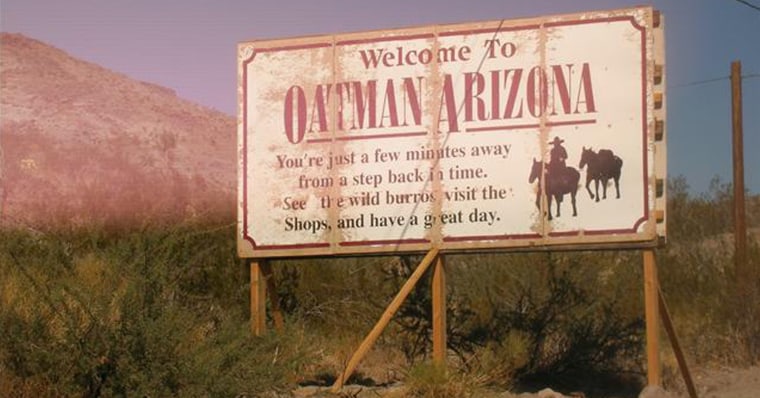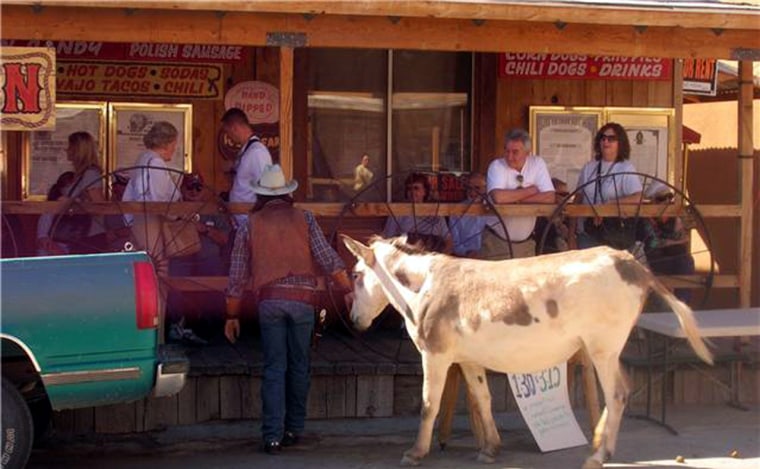There is an epidemic in an old gold mining town in western Arizona: The wild burros that roam the town's single street are overweight, with rolls of fat on their necks and big, full bellies. But don't blame them. They'll eat anything.
It's the half million tourists who visit tiny Oatman each year. They're the ones who have been feeding these critters carrots, hay or anything else, the U.S. Bureau of Land Management says.
The agency, which manages the burros, has launched a campaign it hopes will eventually steer the burros back into the desert to forage for grass and shrubs — and get them back into shape.
"The town has really encouraged burros to be down there; it's part of the draw of Oatman," said Roger Oyler, the program lead for wild horses and burros at the BLM in Phoenix. "We want to try to work with them to have burros around town, but we don't want the people feeding them."
Oatman attracts tourists wanting to see the honeymoon spot of Clark Gable and Carole Lombard and ogle the wild burros. The town of about 120 also boasts staged shootouts, tour bus holdups and shotgun weddings in a throwback to the Wild West.
The dozen burros that roam the street lined with antique, craft and gift shops are descendants of domesticated donkeys that miners released when the federal government shut down the gold mines after World War II.
"If it weren't for the burros, the rest of us wouldn't be here," says Jerry Love, who has worn many hats at the local chamber of commerce.
The BLM acknowledges that its campaign to stop feeding the burros will be a hard sell but likens it to when Yellowstone National Park told visitors there to stop feeding the bears. "As the feed is diminished over time, I think they'll start wandering out and remember what's out there for dinner," Oyler said.

Oatman storekeepers have been asked to stop feeding the burros or providing the treats the animals are so accustomed to. The BLM also has drafted scripts for gunfighters and shop owners that tell tourists quite bluntly that the burros are fat and are being loved to death.
Some slogans that could end up on posters or signs around town include, "No Diet-Busting Cubes or Carrots — Please!" "Keep Oatman Burros Happy and Healthy — No Extra Food," and "Give Burros Care, not Carrots."
The BLM says the burros that don't come into town are a lot healthier and don't have behavioral problems or pain caused by their hooves growing to a thickness that makes it hard for them to walk. "It's a matter of educating the public, but it's not going to happen overnight," Love said. "We don't want to discourage people from coming here because they can't feed the burros."
Love believes that the burros will roam the town regardless of whether they are hand-fed by tourists, but he said he doubts that all tourists will heed the BLM's message.
"BLM is certainly not going to put a carrot cop up here to make sure that nobody feeds the burros," he said. "They don't have the funding nor the manpower."
Jolene Brown, who owns Amargosa Toads, understands the premise of not feeding the animals, but said to cut them off completely from food is wrong.
The animals have been demanding, lately, kicking in the door to her gift shop and chewing at the door panel and on books because they're not getting the food they're used to, she said.
"I'm sure they can learn to forage, but people come from the entire world to feed the burros," said Brown, who refers to herself as the burros' grandma. "I don't agree to feed wild animals at all, but if they have been fed their whole lives, how can you take that away?"
If the burros are unable to fend for themselves and become too skinny, Oyler said the BLM has the option of rounding them up and putting them up for adoption.
